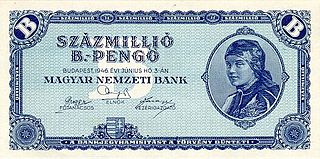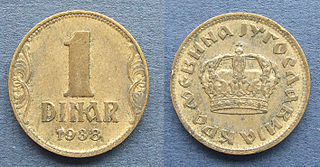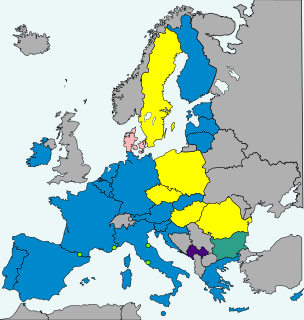Hyperinflation in Yugoslavia may refer to:
Hyperinflation in Yugoslavia may refer to:

In economics, hyperinflation is very high and typically accelerating inflation. It quickly erodes the real value of the local currency, as the prices of all goods increase. This causes people to minimize their holdings in that currency as they usually switch to more stable foreign currencies, in recent history often the US dollar. Prices typically remain stable in terms of other relatively stable currencies.

The Federal Republic of Yugoslavia, known as FR Yugoslavia or simply Yugoslavia, was a country in the Balkans that existed from 1992 to 2003, following the breakup of the SFR Yugoslavia. The Federal Republic of Yugoslavia comprised the Republic of Serbia and the Republic of Montenegro. In February 2003, FR Yugoslavia was transformed from a federal republic to a political union officially known as the State Union of Serbia and Montenegro. In 2006, Montenegro seceded from the union, leading to the full independence of Serbia and Montenegro.

The United Nations member states are the 193 sovereign states that are members of the United Nations (UN) and have equal representation in the UN General Assembly. The UN is the world's largest intergovernmental organization.

Yugoslavia was a country in Southeast Europe and Central Europe for most of the 20th century. It came into existence after World War I in 1918 under the name of the Kingdom of Serbs, Croats and Slovenes by the merger of the provisional State of Slovenes, Croats and Serbs with the Kingdom of Serbia, and constituted the first union of the South Slavic people as a sovereign state, following centuries in which the region had been part of the Ottoman Empire and Austria-Hungary. Peter I of Serbia was its first sovereign. The kingdom gained international recognition on 13 July 1922 at the Conference of Ambassadors in Paris. The official name of the state was changed to Kingdom of Yugoslavia on 3 October 1929.
Yugoslav or Yugoslavian may refer to:

The Socialist Federal Republic of Yugoslavia, commonly referred to as SFR Yugoslavia or simply Yugoslavia, was a country in Southeast and Central Europe that existed from its foundation in the aftermath of World War II until its dissolution in 1992 amid the Yugoslav Wars. Covering an area of 255,804 km2, the SFRY was bordered by the Adriatic Sea and Italy to the west, Austria and Hungary to the north, Bulgaria and Romania to the east, and Albania and Greece to the south. The nation was a socialist state and a federation governed by the League of Communists of Yugoslavia and made up of six socialist republics – Bosnia and Herzegovina, Croatia, Macedonia, Montenegro, Serbia, and Slovenia – with Belgrade as its capital. In addition, it included two autonomous provinces within Serbia: Kosovo and Vojvodina. The SFRY's origin is traced to 26 November 1942, when the Anti-Fascist Council for the National Liberation of Yugoslavia was formed during World War II.
Serbian republic or Serb republic may refer to:

The breakup of Yugoslavia occurred as a result of a series of political upheavals and conflicts during the early 1990s. After a period of political and economic crisis in the 1980s, constituent republics of the Socialist Federal Republic of Yugoslavia split apart, but the unresolved issues caused bitter inter-ethnic Yugoslav wars. The wars primarily affected Bosnia and Herzegovina, neighbouring parts of Croatia and, some years later, Kosovo.

The dinar was the currency of the three Yugoslav states: the Kingdom of Yugoslavia, the Socialist Federal Republic of Yugoslavia, and the Federal Republic of Yugoslavia between 1918 and 2006. The dinar was subdivided into 100 para. In the early 1990s, economic mismanagement made the government bankrupt and forced it to take money from the savings of the country's citizens. This caused severe and prolonged hyperinflation, which has been described as the worst in history. Large amounts of money were printed, with coins becoming redundant and inflation rates reaching over one billion per cent per year. This hyperinflation caused five revaluations between 1990 and 1994; in total there were eight distinct dinari. Six of the eight have been given distinguishing names and separate ISO 4217 codes. The highest denomination banknote was 500 billion dinars, which became worthless a fortnight after it was printed.
Montenegro is a country on the Adriatic coast of the Mediterranean Sea.

The Socialist Republic of Serbia, previously known as the People's Republic of Serbia, was one of the six constituent republics of the Socialist Federal Republic of Yugoslavia. Its formation was initiated in 1941, and achieved in 1944–1946, when it was established as a federated republic within Yugoslavia. In that form, it lasted until the constitutional reform in 1990–1992, when it was reconstituted, as the Republic of Serbia within the Federal Republic of Yugoslavia. It was the largest federated state within Yugoslavia, in terms of population and territory. Its capital, Belgrade, was also the federal capital of Yugoslavia.

Montenegro is a country in South-Eastern Europe, which is not a member of the European Union, Eurozone nor does it have a formal monetary agreement with the EU, but it is one of the two territories that has unilaterally adopted the euro in 2002 as its de facto domestic currency. This means that the euro is not a legal tender there, however it is treated as such by the government and the population.

The Republic of Serbia was a constituent state of the Federal Republic of Yugoslavia between 1992 and 2003 and the State Union of Serbia and Montenegro from 2003 to 2006. With Montenegro's secession from the union with Serbia in 2006, both became sovereign states in their own right for the first time in nearly 88 years.

The former State Union of Serbia and Montenegro appeared at the Olympic Games on two occasions from 2004 until 2006, after which the union was dissolved and Montenegro and Serbia each declared full independence.

Slobodan Milošević was a Yugoslav and Serbian politician who served as the president of Serbia from 1989 to 1992 and within the Federal Republic of Yugoslavia from 1992 to 1997, and president of the Federal Republic of Yugoslavia from 1997 to 2000. He led the Socialist Party of Serbia from its foundation in 1990 and rose to power as Serbian President during efforts to reform the 1974 Constitution of Yugoslavia in response to alleged marginalization of Serbia, views that Serbia's autonomous provinces had too much power, making them almost independent from Serbia, and claims of political incapacity to deter Albanian separatist unrest in Serbia's autonomous province of Kosovo.
The banknotes of the Yugoslav dinar are the several series of paper money emitted by the central bank of the different consecutive states named Yugoslavia.
Dragoslav Avramović was a Serbian economist and the governor of the National Bank of Yugoslavia.
During the Yugoslav Wars of the 1990s and early 2000s, several rounds of international sanctions were imposed against the Federal Republic of Yugoslavia, which consisted of the Yugoslav republics of Serbia and Montenegro. In the first round of sanctions, which were imposed in response to the Bosnian War, and lasted between April 1992 and October 1995, Yugoslavia was placed under a United Nations (UN) embargo. The embargo was lifted following the signing of the Dayton Agreement, which ended the conflict. During and after the Kosovo War of 1998–1999, Yugoslavia was again sanctioned by the UN, European Union (EU) and United States. Following the overthrow of Yugoslav President Slobodan Milošević in October 2000, the sanctions against Yugoslavia started to be withdrawn, and most were lifted by 19 January 2001.
Dragan Jovanović was a cabinet minister in the Federal Republic of Yugoslavia during the early 1990s.

Between 1992 and 1994, the Federal Republic of Yugoslavia (FRY) experienced the second-longest period of hyperinflation in world economic history. This period spanned 22 months, from March 1992 to January 1994. Inflation peaked at a monthly rate of 313 million percent in January 1994. Daily inflation was 62%, with an inflation rate of 2.03% in 1 hour being higher than the annual inflation rate of many developed countries. The inflation rate in January 1994, converted to annual levels, reached 116,545,906,563,330 percent (116.546 trillion percent, or 1.16 × 1014 percent). During this period of hyperinflation in FR Yugoslavia, store prices were stated in conditional units – point, which was equal to the German mark. The conversion was made either in German marks or in dinars at the current "black market" exchange rate that often changed several times per day.